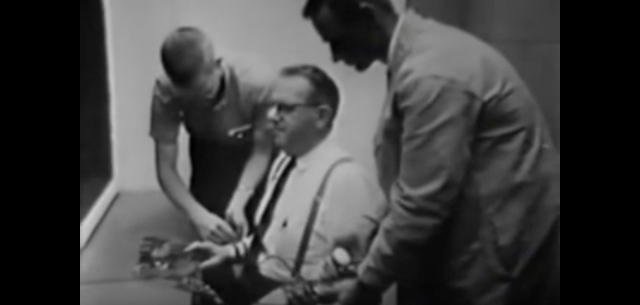
Brunhilde Pomsel, who worked as Joseph Goebbels’ secretary at the center of the Nazis’ propaganda machine, recently gave an interview with The Guardian – at 105 years of age, it will likely be her last. In the interview, she said:
“Those people nowadays who say they would have stood up against the Nazis – I believe they are sincere in meaning that, but believe me, most of them wouldn’t have.”
(You can see Pomsel describing Goebbels in the below trailer to the documentary A German Life.)
It’s natural for us to think we would do the right thing, that we would follow our moral compass and say “no” to the wrongdoings of the powers that be because we’re good, compassionate people.
It’s not that simple, though. And Pomsel may well be correct. Even with the best of intentions, good people are capable of committing heinous acts when told to do so by someone in a position of authority. An experiment conducted by Yale psychologist, Stanley Milgram, in the early ‘60s illustrates how obedience to authority easily overpowers personal conscience.
Milgram’s Experiment
In Milgram’s experiment, the subjects (those whose reactions were being studied) were ‘teachers,’ who were working under the instruction of a ‘researcher’ (in a position of authority).
The teachers were told by the researcher to administer an electric shock to a ‘learner’ whenever the learner made a mistake, with the shock increasing each time. The learner, however, was an actor and only pretending to receive the painful electric shock.
When the teacher refused to give a shock to the learner, the researcher would encourage them to continue with increasingly severe “prods,” from “please continue” to “you have no other choice but to continue.”
In the experiment, 65% of participants (teachers) continued to the highest level of shock, a potentially fatal 450 volts, and all continued to 300 volts despite the apparent pain and distress it was causing the learner. The participants continued to administer these shocks even though they were clearly upset by harming another person.
You can see how one of the participants wrestled with his conscience in this short clip (the full documentary is on YouTube too):
While Milgram’s original experiment has been the subject of much controversy, particularly concerning ethical and methodological issues, many psychologists argue that the basic finding of a human tendency towards obedience holds.
A Modern Milgram Experiment
Earlier this year, an ‘updated’ version of Milgram’s experiment was published in Current Biology.
The study, led by Patrick Haggard, a cognitive neuroscientist at the University of London, aimed to assess the sense of agency in participants – that is, the unconscious feeling of being in control of their own actions.
In this experiment, ‘agents’ (whose actions were being studied) sat across from ‘victims.’ Agents could press one of two keys. In all pairs, the first key did nothing. For some agent/victim pairs, the second key transferred a small amount of money from the victim to the agent. In other pairs, the second key delivered a painful but bearable electric shock (a real shock, unlike in Milgram’s original experiment).
A tone sounded a few hundred milliseconds after either key was pressed and both victims and agents were asked to judge the length of the interval between pressing the key and the tone.
The agents’ perceived time between pressing the key and the tone sounding was used to assess their sense of agency because people will perceive the interval between an action and an outcome as shorter when the action is carried out of their own free will.
When agents were ordered to press the key by a person in a position of authority, they perceived the interval between pressing the key and the tone as longer. This means, that when ordered to press the key they were acting more passively, their sense of agency was reduced.
Interestingly, this effect, the reduction in a sense of agency when being ordered to carry out an action, was seen even when agents were pressing the key that did nothing (i.e. did not cause the victim either physical or financial harm).
The Lesson
When we feel our personal responsibility is lessened through the orders of a higher authority, we are more likely to go against our own conscience. Pomsel was right: many of us probably wouldn’t have stood up to the Nazis as we’d like to think.
The key lesson here is that blindly obeying authority is problematic, but mindful scrutiny of directions from figures of authority (and their repercussions) may make it easier to resist orders that go against your conscience.
This article (Goebbels’ 105 Year Old Secretary is Right: You Wouldn’t Have Stood Up to the Nazis) is a free and open source. You have permission to republish this article under a Creative Commons license with attribution to the author Bullseye and AnonHQ.





That is really attention-grabbing, You’re an excessively professional blogger. I’ve joined your feed and sit up for looking for extra of your fantastic post. Also, I have shared your web site in my social networks